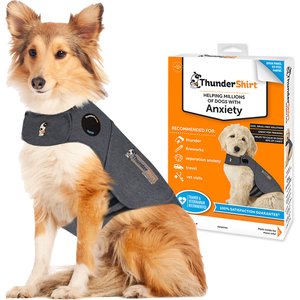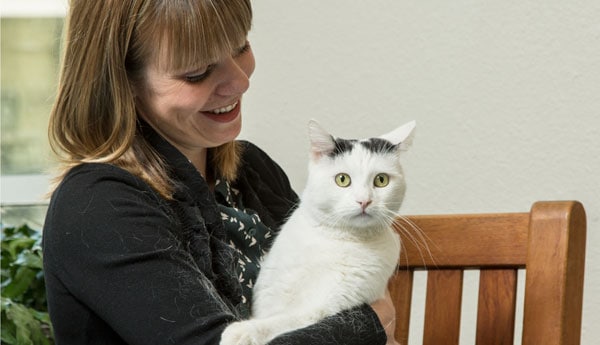Losing a pet is painful for everyone in the family—our other pets included. Dogs who have lost their tug-of-war partners or cats who are missing their cuddle buddies can feel stress and depression after any death in the family. So, what do we do to ease dog depression and cat depression and help our pets work through the grief? Follow these tips from pet mental health experts to support your furry family through this difficult time.
1Notice the Signs of Grieving
Before we even think about helping, we need to understand how pets express grief and be on the lookout for specific dog and cat behaviors. Signs of depression in cats or dogs include:
- Lack of interest or enthusiasm for their usual activities
- Seeking more time with you
- Increased vocalizing
- Lethargy
2Don’t Be Afraid to Consult a Vet
Some of your pet's behaviors might look like grief, but could be caused by something else. It's best to err on the side of caution, and take your pet to the vet if you notice changes in behavior, even if you think it’s in response to grief.
This isn’t to say that you should credit any change to something medical, but to not rule out any possibility. If your pet is refusing to eat, and it goes on for days, it’s time to consult a vet.
3Help Them Get Closure
Having an open casket funeral allows people to say their final goodbyes, and the same principle is true for pets. Allowing other pets to see the deceased pet can help provide closure.
“I have seen many, many animals spend time with the body of a departed loved one, and I think that it’s important for them," says Sally Morgan, a holistic physical therapist for pets and people. "Wolves will sit and howl around a departed pack member if they are in a safe place, as do many other animals. If a person can bear it, I think it is kind to your remaining pet to see the body of the departed and spend time if he chooses to with the body.”
4Stay Strong Through the Long-Haul
Give your pets time, and allow them to feel what they’re feeling. Your pet's depression can be hard to watch, but don’t try to ignore their grief—or your own. Just like us, our pets need time to work through their feelings of loss according to their own timeline. Morgan notes that she has seen animals grieve for weeks or even a few months. Of course, if your animal’s health is affected, be sure to consult your veterinarian.
5Provide Stimulation and Return to Routines
Although everyone needs time to grieve, you can help your pet by returning to your normal routines and spending quality time with them.
“Quieter games may be good for a while, but a return to routine is often the most comforting," says Jme Thomas, Executive Director of Motley Zoo Animal Rescue in Redmond, Washington. "My young Corgi slept close to me as I cried at night missing my departed dog, but after a few days, I got a distinct impression he thought I should get over it and enjoy things in life again, like games of squeaky toss and long walks.”
We need to enjoy the time we still have with the pets that are here. They can find solace in getting back to the routine, and with interactive games and training. According to Thomas, bonding over exercise is priceless, but it's also important to work out their mind.
“Ten to 15 minutes of training work where you ask them to sit, stay, lie down and so on can tire them out more than 3 hours of fetch," she says. "A tired doggy brain is a relaxed doggy brain. Dog puzzle games can help achieve this, too.”
6Give Them Calming Relief
Morgan recommends trying essential oils and flower essences that are formulated for pets to help calm them so they can cope with loss. Nature's Miracle Just For Cats Calming Spray uses herbal, flower and plant seed extracts plus essential oils to help soothe cat depression. NaturVet Quiet Moments Calming Aid Dog Soft Chews and Vet's Best Comfort Calm Soft Chews have chamomile and L-tryptophan, ingredients that Thomas says can help ease anxiety. You might also find dog depression relief with the comforting design of a ThunderShirt, which can provide calming comfort in many situations.
7Have Patience When Behaviors Change
With any disruption to the pack, whether it’s a human or animal who dies, you should expect some changes in your pet's behavior. In Thomas’s pack, after the death of her dog Zelda, her other dog Meatball started having fits at night, waking up howling because Zelda wasn’t in her crate next to him. This isn't ideal, of course, and you may feel less equipped to handle it as you navigate your own grief. But try to understand yoru pet's new needs, and consider what they might need to feel better. As a way to ease Meatball's stress, for example, Thomas set up an exercise pen in the living room for him to sleep in. If you're having trouble, you can consult a pet behaviorist for help.
8Carefully Consider Introducing a New Pet
The question of whether you should get another pet, or when, will come up sooner or later. So, what's the right time, if any, to bring another pet home? It's really all about how you and your pet are feeling. Some pet parents bring a new animal home immediately; others don't feel ready for weeks, months or even years. And for pets, Thomas says, a new pet can be a comfort—but they might also be a challenge to integrate into the household.
Every situation is different, but Morgan recommends waiting at least a few weeks before adding a new pet to your family, to give everyone in the household time to grieve.
And if you're not sure you're ready? There's always the option of a trial run. “Sometimes people foster instead of getting another pet, which we see a lot of, and this can be very therapeutic,” adds Thomas.
Here For You
Share:













